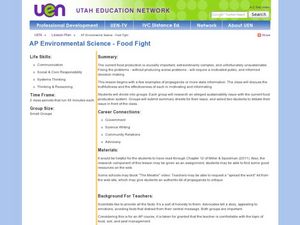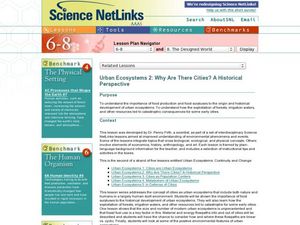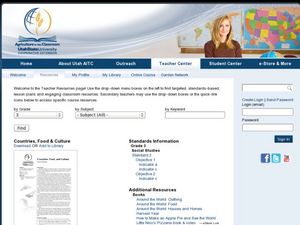Curated OER
A Yen for Maximum Residue Limits in Food
Future public health officials or agriculturists read an article and answer questions concerning the Japanese regulations for pesticide exposure. They compare the maximum residue limit for two, 4-D of Japan with other countries. This is...
Curated OER
Food Science, Scientific Method: Reliability and Validity in Empirical Research
Secondary learners explore food science by conducting an experiment using the scientific method and creating a science fair project based on their findings. They learn about food technology and modern research development. They...
One Hen
Making Choices
When choosing what foods to eat, there are a lot of factors to consider. To help make the decision a little easier, young learners work in small groups developing short plays, stories, or advertisements that address the different issues...
Curated OER
AP Environmental Science-Food Fight
The content in this instructional activity is of a controversial nature. Please review to make sure it is suitable for your class. A video, The Meatrix is shown to the class, and then they discuss the emotionally-charged language that it...
Curated OER
Food Without Oil
Students discuss the oil crisis and how it affects the food they eat. In this food production lesson, students look at the foods sold in their grocery store and imagine which would leave if there was no oil to ship the food. They watch...
Curated OER
Sustainable Agriculture: Soils And Food Production
Ninth graders recognize differences in soil quality from one area to another. They describe the importance of organic matter in soil health and suggest ideas that help provide adequate food supplies for the world. The interview a person...
Curated OER
Urban Ecosystems 2: Why are There Cities? A Historical Perspective
Second in a series of five lessons, this lesson encourages preteens to consider cities as urban ecosystems. First, they keep a food diary for a few days. They visit the Natrional Agricultural Statistics Service website for current data...
Curated OER
Step by Step
Students explore agriculture by creating a food production diagram. In this farming lesson, students read assigned text about the entities that assist in food production companies such as farmers, truckers and supermarkets. Students...
Curated OER
Urban Ecosystems 2: Why Are There Cities? A Historical Perspective
Students investigate the importance of food surpluses to the historical development of urban ecosystems.
Serendip
Food, the Carbon Cycle and Global Warming
As the world population increases, demands on the carbon cycle also increase. A well-designed lesson first explores the greenhouse effect and its impact on global warming. Further sections have pupils study the effect of greenhouse gases...
National Library of Medicine
Your Environment, Your Health: Food Safety
Did youknow that chicken causes the greatest risk of food-borne illness. The fourth unit in a six-part series addresses food safety. Scholars research common scenarios of food causing illness through the National Institute for Health....
Curated OER
Alternative Animal Agriculture
Presenting an unusual topic, this collection of slides examines alternative animals that can be grown for profit or human use. It details the raising of rabbits as food, llamas for textiles, earthworms as fish bait, and a variety of...
Curated OER
Animal Science as Agriculture
The methods by which farming and agriculture became a valid area of study and research are detailed in this PowerPoint. Also presented are the steps involved for improving productivity and efficiency. The use of scientific method and...
Curated OER
Pesticide Watch Card
Students examine human health by identifying dangerous pesticides. In this agriculture lesson, students research the food production system in the United States and discuss dangers such as pesticides, chemicals and insecticides which...
Curated OER
KORN-TV Newsroom
Role-play to learn. Writers pretend to be a team of news writers. They research information about genetically engineered corn and the impact of biotech food products. Then create a video, Powerpoint, or oral presentation to present their...
California Academy of Science
Rapid Brainstorming: How Can We Improve Our Global Food System?
In 2018, the average fast food burger cost $2.64 while a salad averaged $4.14. Does the price difference matter to public health? Scholars consider that question and others in a brainstorming session about improving our global food...
California Academy of Science
Sustainable Food Solutions: Weighing the Pros and Cons
A growing demand for sustainable food systems comes from schools and even some cities. So what are some solutions? Scholars consider four different ways to approach sustainable food solutions and list the pros and cons of each. The fifth...
Curated OER
From Milk to Cheese and Seed to Shelf
Young scholars learn about food production by making cheese, seeing how a seed gets to a shelf, and discussing food safety. In this food production lesson plan, students complete 3 days worth of activities and learn about food...
Curated OER
Countries, Food and Culture
Third graders explore food production by researching culinary culture on the Internet. In this global food lesson, 3rd graders read assigned text about the different dietary habits of foreign cultures based upon their environment....
Curated OER
History of Biotechnology
Ancient, classical, and modern methods of biotechnological methods are introduced in this science PowerPoint. Students should be interested to see how advanced people have been through the ages in adapting their methods to procure...
Curated OER
The Plant Food Factory
Plants need sun and water to survive. Let kids discover these facts by reading a block of informational text and considering a scientific quandary. They read the text, then use the information to complete a two-part question about plant...
Curated OER
Sharin the culture of food production
Young scholars compare food production and procurement in Alaska and the Russian Federation. They compare food production and procurement within Alaska. Pupils comprehend and appreciate the differences Alaskan students meet children...
Curated OER
Food Preservation: Food Science, Canning, Gardening
Learners consider the procedures and safety issues involved in food preservation. They conduct experiments in canning, freezing and drying. If everyone can preserve food utilizing a variety of methods and science principles, the lesson...
Curated OER
Food Chain
Fourth graders use a database on animal diversity to complete the lesson. Using the information, they discover how organisms are linked to one another by their dependence on each other for food. In groups, they develop their own food...
Other popular searches
- Food Production Flow Charts
- Food Production by Continent
- Hormones & Food Production
- Plant Food Production
- Food Production Chain
- Food Production Plan
- Energy and Food Production
- Tree Food Production
- Food Production Oil
- Mass Production Food
- Anthropology Food Production
- Bacteria in Food Production

























